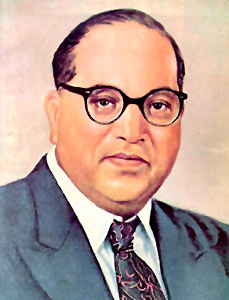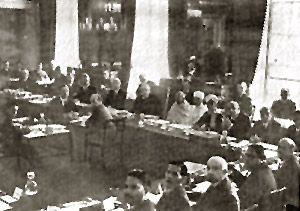 Bhimrao Ambedkar as a child, was excelling in his studies, but was increasingly disturbed by his segregation and discrimination. He had strong fervor to attain social justice among the Indian communities for this purpose he began his vocation. Dr. Ambedkar was an iconoclastic social reformer who at the very formative years of his career realized what it meant to be an untouchable and how struggle against untouchability could be launched. The social reform movement of the caste Hindus could not win him to its side because of his existential understanding of the pangs of untouchability.
Bhimrao Ambedkar as a child, was excelling in his studies, but was increasingly disturbed by his segregation and discrimination. He had strong fervor to attain social justice among the Indian communities for this purpose he began his vocation. Dr. Ambedkar was an iconoclastic social reformer who at the very formative years of his career realized what it meant to be an untouchable and how struggle against untouchability could be launched. The social reform movement of the caste Hindus could not win him to its side because of his existential understanding of the pangs of untouchability.
In 1908, he entered Elphinstone College and obtained a scholarship of twenty five rupees a month from the Gayakwad ruler of Baroda, Sahyaji Rao III for higher studies in the USA by 1912. For the first time in his life, Bhim Rao was not demeaned for being a Mahar. From America, Dr Ambedkar proceeded to London to study economics and political science. But the Baroda government terminated his scholarship and recalled him back. Thus he prepared to take up employment with the Baroda state government. His wife gave birth to his first son, Yashwant, in the same year.
The Maharaja of Baroda appointed Dr Ambedkar as the political secretary. He returned to Mumbai and joined as professor of political economy at the Sydenham College of Commerce and Economics in Mumbai with the help of an English acquaintance, the former Bombay Governor Lord Syndenham. The Southborough Committee was preparing the Government of India Act 1919 at that time and invited Dr.Ambedkar to testify it as a leading Dalit scholar. At this hearing, Ambedkar argued for creating separate electorates and reservations for Dalits and other religious communities. In 1920, he began the publication of the weekly "Mooknayak", the "Leader of the Silent" in Bombay. Ambedkar used this journal to criticize orthodox Hindu politicians and a perceived reluctance of the Indian political community to fight caste discrimination. The local state ruler Shahu IV was impressed with his speech at a Depressed Classes Conference in Kolhapur and Shahu IV shocked orthodox society by dining with Ambekdar and his untouchable colleagues. Ambedkar exhorted his Mahar community to abandon the idea of sub-castes, and held a joint communal dinner in which the principle of segregation was abandoned.
 After completing his studies in London, Ambedkar returned to India. In July 1924, he founded the `Bahishkrit Hitkaraini Sabha`, Outcastes Welfare Association with the aim to uplift the downtrodden socially and politically and bring them to the level of the others in the Indian society. In his acclaimed publication "Pakistan and the Partition of India", he writes that, while Islam speaks of "brotherhood", the practice of slavery and caste discrimination were rampant in Muslim society in South Asia, such as the Ashraf/Ajlaf caste divide and the severe discrimination against the Arzal castes or Dalit Muslim untouchables. Thus it states that he was highly critical of the practice of the untouchability in Indian Muslim Society and was speaking of reforming social evils both in Hinduism and Muslim society.
After completing his studies in London, Ambedkar returned to India. In July 1924, he founded the `Bahishkrit Hitkaraini Sabha`, Outcastes Welfare Association with the aim to uplift the downtrodden socially and politically and bring them to the level of the others in the Indian society. In his acclaimed publication "Pakistan and the Partition of India", he writes that, while Islam speaks of "brotherhood", the practice of slavery and caste discrimination were rampant in Muslim society in South Asia, such as the Ashraf/Ajlaf caste divide and the severe discrimination against the Arzal castes or Dalit Muslim untouchables. Thus it states that he was highly critical of the practice of the untouchability in Indian Muslim Society and was speaking of reforming social evils both in Hinduism and Muslim society.
He became a nominated member of the Bombay Legislative Council in 1926. By the time of 1927 Dr Ambedkar decided to launch active movements against untouchability. He began with public movements and marches to open up & share public drinking water resources, to which until then untouchable communities had no access; also he put up a struggle for entry into Hindu temples. His attempts were strictly forbidden by the upper caste communities. Ambedkar led the Mahad March at the Chowdar Tank at Colaba, near Bombay, to give the untouchables the right to draw water from the public tank where he burnt copies of the `Manusmriti` publicly. Ambedkar organized a ceremony at the Koregaon Victory Memorial near Pune on January 1, 1927, in the memory of the Indian soldiers who had died in Second Anglo-Maratha War at Battle of Koregaon. In that ceremony he inscribed the names of the soldiers who were from the Mahar Community on a marble tablet. The "Manusmriti",the ancient Hindu classical text was condemned and burned by his followers in a Depressed Classes Conference on December 24, for justifying the system of caste discrimination and untouchability. In 1927, he began his second journal, "Bahiskrit Bharat",Excluded India, later rechristened "Janata", The People. He was then appointed to the Bombay Presidency Committee to work with the all-European Simon Commission in 1928. This commission had sparked great protests across India.
Ambedkar`s criticisms and political work had made him very unpopular with orthodox Hindus, as well as with many Congress politicians who had earlier condemned untouchability and worked against discrimination across India. This was largely because these `liberal` politicians usually stopped short of advocating full equality for untouchables. Ambedkar`s prominence and popular support amongst the untouchable community had increased, and he was invited to attend the Second Round Table Conference in London in 1931. Here he sparred verbally with Gandhi on the question of awarding separate electorates to untouchables.[ A fierce opponent of separate electorates on religious and sectarian lines, Gandhi feared that separate electorates for untouchables would divide Hindu society for future generations.
When the British agreed with Ambedkar and announced the awarding of separate electorates, Gandhi began a fast-unto-death while imprisoned in the Yeravada Central Jail of Pune in 1932. Exhorting orthodox Hindu society to eliminate discrimination and untouchability, Gandhi asked for the political and social unity of Hindus. Gandhi`s fast provoked great public support across India, and orthodox Hindu leaders, Congress politicians and activists organized joint meetings with Ambedkar and his supporters at Yeravada. Fearing a communal reprisal and killings of untouchables in the event of Gandhi`s death, Ambedkar agreed under massive coercion from the supporters of Gandhi to drop the demand for separate electorates, and settled for a reservation of seats. Ambedkar was later to criticize this fast of Gandhi`s as a gimmick to deny political rights to the untouchables and increase the coercion he had faced to give up the demand for separate electorates.






